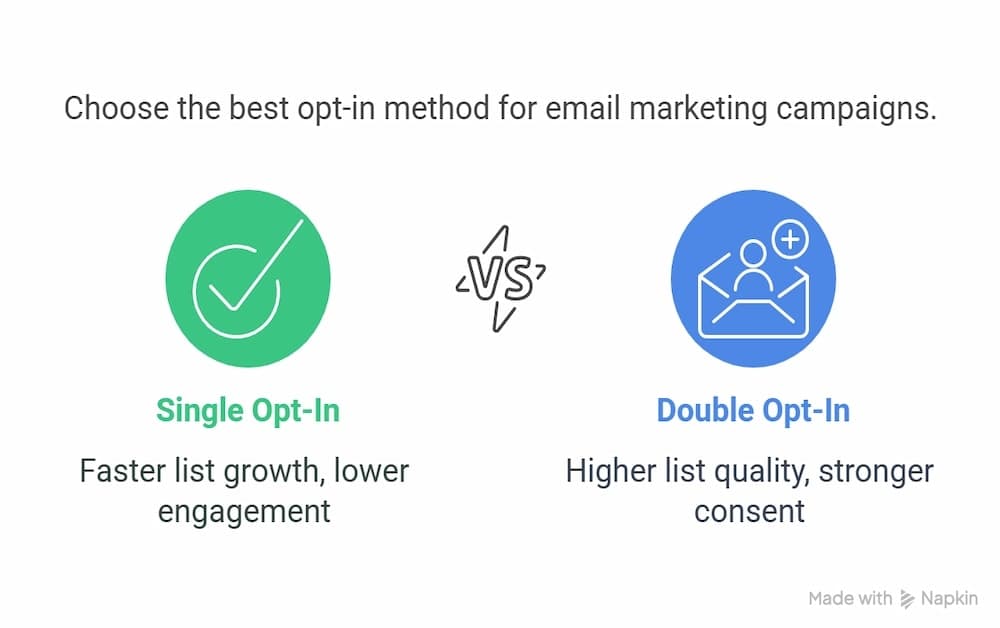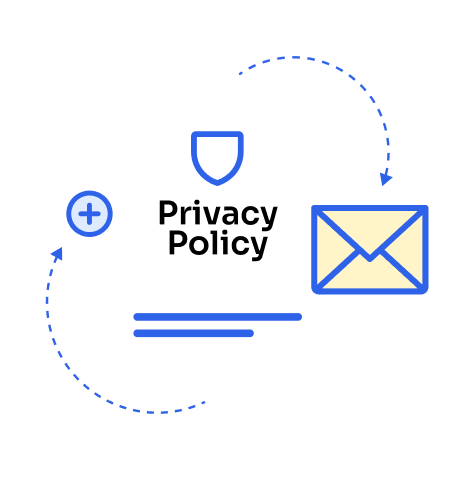Introduction
A privacy policy for email marketing is a formal, electronic document that explains how an organization collects data, including email addresses and IP addresses, and how that data will be used in email marketing campaigns. It specifies the roles of the data controller (the business determining the purposes and means of processing) and any data processors (third-party email marketing service providers). By detailing your data collection practices and the lawful basis for data processing, such as express consent or legitimate interest under the GDPR, you demonstrate transparency and commitment to personal data protection.
Moreover, a well-crafted policy outlines subscriber rights, like the ability to opt-out, request access, or withdraw consent, and explains the technical and organizational security measures (e.g., encryption, access controls) used to safeguard consumer data. It also provides clear instructions for unsubscribing (the mandatory unsubscribe link) and includes your business’s contact information and mailing address, fulfilling requirements under laws such as the CAN-SPAM Act.
Importance of Privacy in Email Marketing
Protecting personal data in email marketing is fundamental to earning and maintaining subscriber trust. Addressing data privacy concerns is crucial, as customers are increasingly aware of these issues and may distrust businesses that mishandle their personal information. When customers know you respect their personal information and comply with privacy regulations, they are more likely to engage with your promotional emails and remain on your list. Transparent email marketing practices reduce the risk of spam complaints, improve deliverability, and foster long-term customer relationships.
Non-compliance, by contrast, can lead to severe financial penalties—up to €20 million or 4 percent of global turnover under the GDPR—and reputational damage. The California Consumer Privacy Act similarly imposes fines of up to $2,500 per violation or $7,500 per intentional violation, not to mention the potential for class-action lawsuits. A comprehensive privacy policy helps preempt these risks by ensuring your email marketing practices comply with all relevant data privacy laws.
Key benefits of a strong privacy policy include:
- Clarity on data collection and how you collect personal information, such as email addresses and contact details.
- Guidance on consent mechanisms, including express consent, double opt-in, and clear descriptions of implied consent limitations.
- Commitment to data minimization and retention policies that prevent unnecessary data storage.
- Procedures for honoring opt-out requests and providing an unsubscribe link in every email.
Laws and Regulations Governing Email Marketing

European Union: GDPR
The General Data Protection Regulation (GDPR) governs any organization processing the personal data of EU residents, regardless of where the organization is based. Data controllers are responsible for ensuring compliance with GDPR regulations, particularly in email marketing practices. It defines “personal data” broadly to include identifiers like IP addresses and requires a lawful basis, most commonly, explicit consent, for processing marketing emails. Importantly, GDPR mandates a Data Processing Agreement between controllers and processors (Article 28), detailing processing scope, duration, and security obligations.
United States: CAN-SPAM and CCPA
The CAN-SPAM Act regulates commercial electronic messages in the U.S., requiring businesses to include a valid physical mailing address, provide an unsubscribe link, and promptly honor opt-out requests within 10 business days. The Act specifically addresses ‘commercial email’, setting regulations for businesses sending promotional emails, including the need for consent from recipients and penalties for non-compliance. Unlike GDPR, CAN-SPAM does not mandate prior consent for sending marketing emails but prohibits misleading subject lines and header information.
The California Consumer Privacy Act (CCPA) grants Californian consumers rights to access, delete, and opt-out of the sale of their personal information; it applies to businesses meeting certain revenue or data-handling thresholds. Under the California Privacy Rights Act (CPRA) enhancements, businesses must disclose categories of personal data collected and provide a “Do Not Sell or Share My Personal Information” link.
Canada: CASL and PIPEDA
Canada’s Anti-Spam Legislation (CASL) requires express consent before sending commercial electronic messages, with strict record-keeping for consent forms; implied consent is only valid under limited circumstances, such as existing business relationships. A commercial electronic message (CEM) under CASL includes not only marketing emails but also instant messages, texts, and social media communications, emphasizing the importance of obtaining consent for these messages. Violations carry fines up to $10 million per violation.
The Personal Information Protection and Electronic Documents Act (PIPEDA) sets fair information principles for private-sector organizations handling personal data in commercial activities, including openness, consent, and security requirements; it also recognizes electronic documents and signatures.
Data Collection and Use
Email marketers routinely collect personal data, such as email addresses, IP addresses, and other contact details, to personalize email marketing campaigns and improve engagement. They also collect email addresses in compliance with privacy laws like CalOPPA, GDPR, and CCPA. Additionally, they collect information about users, detailing the types of data gathered, including personal data and data from minors. However, these data collection practices must be transparent, with clear disclosures in your privacy policy about what subscribers’ personal data you collect and why.
Under GDPR and similar laws, you must obtain consent before collecting and processing personal data unless another lawful basis applies. Consent must be freely given, specific, and informed, with an explicit opt-in mechanism; pre-ticked boxes or inactivity do not constitute valid consent. For Canadian CASL compliance, record express consent requests, including timestamps and IP addresses, to demonstrate legal compliance.
When leveraging third-party service providers (such as email marketing platforms), GDPR Article 28 requires a Data Processing Agreement specifying compliance with broader GDPR practices and policies:
- Subject-matter and duration of processing
- Nature and purpose of the processing
- Categories of personal data and data subjects
- Obligations and rights of both the controller and the processor
Consumer Privacy and Rights
Subscribers have several data privacy rights, including:
- Right of access: Users can request a copy of their personal data.
- Right to rectification: Users can correct inaccurate information.
- Right to erasure: Users can request the deletion of their personal data.
- Right to restrict processing: Users can limit how their data is used.
- Right to data portability: Users can receive their data in a commonly used format.
- Right to object: Users can object to direct marketing at any time.
It is crucial to inform the email address owner about how their email addresses are processed and utilized, especially in the context of email marketing, to ensure compliance with data protection regulations.
Under CCPA, consumers also have the right to request disclosure of data categories collected and the right to opt-out of the “sale” of their personal information. Businesses must provide simple mechanisms to submit these requests, verify consumer identity, and respond within statutory timeframes.
Beyond request handling, organizations must implement robust security measures, such as encryption at rest, access controls, and secure data storage solutions that comply with privacy regulations. In the event of a personal data breach, GDPR mandates notification to supervisory authorities within 72 hours of discovery, along with communication to affected individuals if there is a high risk to their rights and freedoms.
Email Marketing Campaigns and Policies
A dedicated policy for email marketing should articulate your organization’s data collection, usage, sharing practices, and retention periods. At a minimum, it should cover:
- Scope of marketing communications and audience segmentation, including details about your email marketing campaign
- Legal bases for processing subscriber data (e.g., consent, contract)
- Consent acquisition methods (single opt-in vs. double opt-in)
- Unsubscribe and opt-out processes
- Data retention and deletion schedules
- Third-party service provider obligations under a DPA
It is essential to include an email marketing clause in your privacy policy to comply with legal requirements such as GDPR and CAN-SPAM.
Including a double opt-in process—where subscribers confirm their email address via a follow-up message—enhances list quality and demonstrates strong explicit consent, especially in jurisdictions like Germany.
Your policy must also list contact details, such as a valid email address, mailing address, and a link to your privacy policy itself. Under CAN-SPAM, every promotional email must include the sender’s valid physical postal address (street address, P.O. box, or private mailbox).

Marketing Emails and User Consent
When planning marketing emails, distinguishing between express consent and implied consent is critical. For GDPR and CASL compliance, implied consent, such as from a mere website visit, is insufficient; you must obtain a clear, affirmative opt-in from subscribers. Express consent records, including timestamps and IP addresses, should be kept for auditing purposes.
Under GDPR, emailing existing customers may not always require consent due to the legal basis of legitimate interest, but this remains a contentious issue within the framework of these regulations.
By contrast, the CAN-SPAM Act does not require prior consent but mandates that recipients can opt-out of future messages. Once a recipient unsubscribes, you must honor opt-out requests within 10 business days and ensure no further marketing emails are sent. Many email marketers adopt consent-first approaches voluntarily to maintain best practices and improve engagement rates.
Data Storage and Security
Secure data storage is a cornerstone of consumer data protection. Use encrypted databases, role-based access controls, and regular security audits to prevent unauthorized access. Retention schedules should align with legal requirements and be clearly outlined in your privacy policy.
It is essential to understand that while the data controller determines the purpose and means of data processing, the data processor acts on behalf of the controller to handle that data, making it critical for companies to ensure their data processors comply with relevant data privacy laws.
In the event of a data breach, GDPR Article 33 requires that the data controller notify the relevant supervisory authority within 72 hours of becoming aware of the breach, unless it’s unlikely to risk individuals’ rights and freedoms. If individuals are at high risk, they must also be informed promptly. All breaches must be documented, recording facts, impacts, and remedial actions taken.
Best Practices for Email Marketing
To maintain compliance and subscriber trust, adhere to these best practices:
- Be transparent: Clearly state what personal data you collect and how you use it. Emphasize data transparency to ensure users understand how their data is collected, processed, and shared.
- Use concise privacy notices: Place them prominently during signup and in email footers.
- Implement double opt-in: Confirm subscriptions to verify email address ownership.
- Honor opt-out requests swiftly and maintain clean mailing lists.
- Limit data collection to what’s necessary for marketing purposes.
- Regularly review and update your privacy policy to reflect changes in laws like the California Consumer Protection Act and new international laws or guidelines.
By embedding privacy considerations throughout your email marketing strategy, you foster loyalty and reduce legal risks associated with non-compliance.
Conclusion
Creating an accurate and detailed privacy policy for your email marketing strategy is vital to comply with data privacy laws such as the GDPR, CCPA, CAN-SPAM Act, CASL, and PIPEDA. By clearly informing subscribers about your data collection practices, obtaining explicit consent, providing easy unsubscribe links, and implementing strong security measures, you protect both your customers’ personal data and your organization’s reputation.
Transparency in personal data collection is crucial, as it helps build trust and ensures compliance with legal requirements.
A well-crafted privacy policy not only ensures legal compliance but also demonstrates your commitment to data privacy and consumer rights, laying the foundation for more trustworthy and effective email marketing campaigns.




